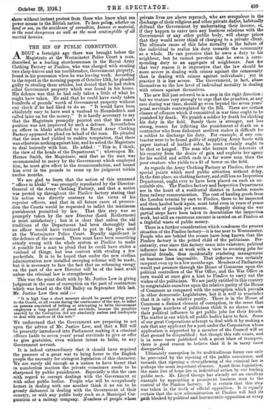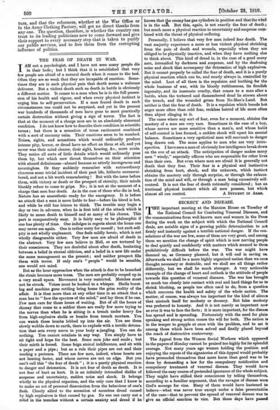THE SIN OF PUBLIC CORRUPTION.
ABOUT a fortnight ego there was brought before the Magistrate at the Westminster Police Court a man, described as a leading storehouseman in the Royal Army Clothing Factory at Pimlico, who was charged with stealing two clasp-knives and ten toothbrushes, Government property, found in his possession when he was leaving work. According to the report in the morning papers of October 13th, he pleaded guilty to stealing these articles, but denied that he had stolen _other Government property which was found in his house. His defence was that he had only taken a little of what he might have taken. He said that he could have easily taken hundreds of pounds' worth of Government property without any check if he had liked to do so. "It would have been absolutely easy to have sent a vanload to Houndsditch and called later on for the money." It is hardly necessary to say that the Magistrate promptly pointed out that the man's position was not improved by such a defence. Nevertheless an officer in khaki attached to the Royal Army Clothing Factory appeared to plead on behalf of the man. He pleaded that the man had yielded to sudden temptation, that there was otherwise nothing against him, and he asked the Magistrate to deal leniently with him. He added : " This is, I think, the view of the heads of the Department " ; whereupon Mr. Horace Smith, the Magistrate, said that as the man was recommended to mercy by the Government which employed him, he must give effect to the recommendation, and bound him over in ten pounds to come up for judgment within twelve months.
We are glad to learn that the action of this unnamed " officer in khaki " was promptly repudiated by the Director- :General of the Army Clothing Factory, and that a notice was posted up throughout the Pimlico factory stating that his action was directly eentrary to the views of his superior officers, and that in all future cases of proseeu- stion the Courts would be requested to inflict •the maximum punishment permitted by law. That this step was so promptly taken by the new Director (Lord Rothermere) os most satisfactory ; but it is clear that unless the old traditions of the Department had been thoroughly bad PP officer would have ventured to put in the plea used at the Westminster Police Court. Equally significant is the defence of the accused. There must have been something utterly wrong with the whole system at Pimlico to make it possible for a man to plead that he could have stolen a vanload of things, but was content with stealing a few pocketfuls. It is to be hoped that under the new civilian administration now installed sweeping reforms will be made, -but it is necessary to face the fact that no reforming energy -on the part of the new Director will be of the least avail unless the criminal law is strengthened.
This was the point dealt with by Mr. Justice Low in giving `judgment in the case of corruption on the part of contractors which was heard at the Old Bailey on September 113th last. Mr. Justice Low then said :- It is high time a short measure should be passed giving powo, to the Courts, at all events during the continuance of the war, to inflict ,on persona convicted of bribing or attempting to bribe Government employees a long period of penal servitude, because the -penalties enacted by the Corruption Act are absolutely useless and inadequate to deal with matters of this sort."
We understand that the Government are preparing to act .upon the advice of Mr. Justice Low, and that a Bill will be presently-introduced into Parliament making it a criminal offence liable to seven years' penal servitude to give or offer 'to give gratuities, even without intent to bribe, -to any Government servant.
It is indeed extraordinary that it should have required the pressure of a great war to bring home to the English people the necessity for stringent legislation of this character. Ikre are surely old enough as a nation to have learnt that in numberless matters the private conscience needs to be sharpened by public punishment. Especially is this the case .with regard to corrupt dealings with the Government or with other public bodies. People who will be scrupulously honest in dealing with one another think it no sin to be grossly dishonest in dealing with the Government of their country, or with any public body such as .a Municipal Cor- poration or a railway company. Numbers of people whose private lives are ,above reproach, who are ecrupnlous in the discharge of their religions and other private dupes, habitually defraud the government by understating their income' or, if they happen to enter into any business relations with the Government or any other public body, will charge prices that they would never think of charging to a private client. The ultimate cause of this false morality is the failure of the individual to realize his duty towards the community as a whole. He can perceive that he owes a duty to his neighbour, but he cannot perceive that he owes a corre- sponding duty to an aggregate of neighbours. Just /or that very reason it is imperative that the law should be more severe in dealing with crimes against the community than in dealing with crimes against individuals i • yet in practice it is lees severe. The Government, in fact, abase themselves to the low level of individual morality in dealing with crimes against themselves.
The new Bill just referred to is a step in the right direction; but we venture very strongly to urge that the penalties, at any rate during war time, should go even beyond the seven years' penal servitude contemplated by the Bill. There are certain classes of offences which if committed in war time ought to be punished by death. We punish a soldier by death for shirking his duty in the field. Surely there is stronger, not less strong, reason for inflicting the punishment of death on contractor who from dishonest motives makes it difficult for a soldier to discharge his duty. For example, if any con- tractor were to be found guilty of supplying Army boots with paper instead of leather soles, he most certainly ought to be shot or hanged. The man who betrays the interests of his country from the desire of gain and exploits her agony for his sordid and selfish ends is a far worse man than the poor creature who yields to a fit of terror on the field.
As regards the Army Clothing Factory at Pimlico, there are special points which need public attention without delay. In the first place, no clothing factory, and still less no Inspection Department, ought ever to have been placed on such an un- suitable site. The Pimlico factory and Inspection Department are in the heart of a residential district in London remote from railway communication. The cost of hauling goods from the London termini by cart to Pimlico, there to be inspected and then hauled back again, must total even in years of peace thousands of pounds per annum. Happily during the war partial steps have been taken to decentralize the inspection work, but still an enormous amount is carried on at Pimlico at a frightful waste of public money.
There is a further consideration which condemns the present situation of the Pimlico factory—it is too near to Westminster. People who are behind the scenes have long known that the Pimlico factory. is the petted child of the politicians. Per- sistently, ever since this factory came into existence, political influence has been at work with a view to securing jobs for political friends, thus incidentally rendering management on business lines impossible. That influence was certainly rampant even up to a few months ago. Members of Parliement would put pressure through the House of Commons upon the political controllers of the War Office, and the War Office ilk turn would at once give a hint to Pimlico to carry out the wishes of the politicians. We are justly entitled %this country . to congratulate ourselves upon the relative purity. of the House of Commons as compared with the corruption which prevails in other democratic Legislatures, but it is well to remember that it is only a relative purity. There is in the House of Commons a distinct element of corruption, in the sense that very large numbers of politicians think it no shame to use their political influence to getpublic jobs for their friends. The matter is one which all public bodies have to face. Some of our great Corporations attempt to deal with it by making a rule that any applicant for a post under the Corporation whose application is supported by a member of the Council will on that ground be disqualified ; but though this rule exists, and is in some cases published with a great blare of trumpets, there is good reason to believe that it is in many cases disregarded. Ultimately corruption in its multitudinous forms can only be prevented by the ripening of the public conscience, and towards that ripening a strengthening of the criminal law is perhaps the most important element. Apart from legislation, the main line of hope lies in individual action by our leading public men. Mr. Lloyd George has already set an excellent example by appointing a prominent business man to the control of the Pimlico factory. It is certain that this step was taken in the teeth of official opposition. It is equally certain that the new administration at Pimlico will find its path blocked by political and bureaucratic opposition at every
turn, and that the reformers, whether at the War Office or in the Army Clothing Factory, will get no direct thanks from any one. The question, therefore, is whether the country can trust to its leading politicians now to come forward and give their support to every necessary step that is taken to purify our public services, and to free them from the corrupting influence of politics.



































 Previous page
Previous page